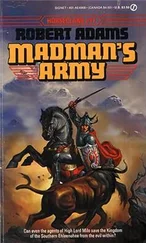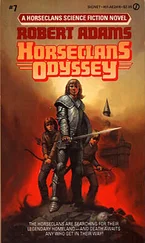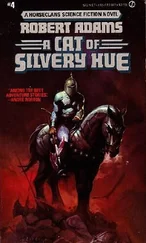Tomos nodded knowledgeably. “Yes, I know, Sitheeros. We of western Karaleenos have been troubled by that same tribe of barbarians for as long as we have been in the foothills, hundreds of years now.”
“Yes, well, anyway,” Sitheeros continued, “I knew that rather than see their folk starve that winter, the Tchatnoogas were certain to mount large-scale raids against my lands and any other border duchies within range, so I counciled with my peers and we collected surplus grain, winnowed through our herds and sent the first of quite a few wagon trains up to Kleevluhnd—that first one under strong guard, of course—where I personally gave its contents to Chief Ritchud, who was a young man then, about of an age with me, and but recently having succeeded to the chieftaincy of the Tchatnooga Tribe.
“That was the beginning, Tomos. There was not a single raid that year; moreover, when the old king heard what we had done up there, he allowed us to credit part of our gifts against our yearly taxes—you see, Hyamos was not always a bad king; only as he aged and his mind began to slip did his son begin to influence him to his and the kingdom’s detriment. Eight years later, when a severe, localized flood ravaged part of my domains and those of Thoheeks Djordjeeos Lahmdos of Yoyooliahn-skeera in the early spring after a very bad winter, Chief Ritchud himself came down with above two thousand of his warriors to help us drain the lands in time for putting in the year’s crops. Many would’ve gone hungry that next winter but for the help of those good barbarians.
“Twenty years, almost to the day, after we were become friends, the accursed Ahrmehnee again invaded. That time, three other thoheeksee and I gathered our warbands and as much of our spear levies as could be spared from working the lands, took six of my war-elephants and marched up into Tchatnooga lands. Our force combined with that of the Tchatnoogas, and their barbarian allies managed to finally bring those Ahrmehnee to battle and trounce them so thoroughly that, to the best of my knowledge, they never have raided in any force again, not against the Tchatnooga tribal lands, anyway.
“Since the sundering of the old Kingdom of Mehmfiz, years back, there are three paramount chiefs in all of the lands of Tenzsee, and the sire of that girl you just married is one of them, so please, I sincerely beg of you—even if she snores, stinks, wolfs her food and guzzles her wine, spits on the carpets, pisses the bed or burns down the house, please try to like her, for a border war of the proportions that Chief Ritchud could bring about might very well end our new and hopefully better rule of Council rather than of kings before it has hardly commenced.”
When the feasting finally was done and the last healths had been drunk, when Sitheeros and Gil, both far too drunk to safely fork a horse, had been tumbled into the wain to be driven back into the city by Sitheeros’ servants and cooks, then Tomos—still almost sober—ordered the sunken tub in the bathroom of the kitchen house filled and relaxed in the steaming, blood-warm water while his body servant laved him, oiled his dark-auburn hair and reddish beard, then lightly scented his body.
Wrapped in yards of thick linen sheeting, he walked back over to the house and, in his attiring room, exchanged the sheeting for a soft knee-length tunic, a pair of felt shoes and a quilted cotton robe of dark green. While chewing at a couple of dried cardamom pods, he gave orders to his guards and the house servants that he was to be disturbed only in the event of a full scale alien invasion or the outbreak of a serious rebellion; any and all other matters could and must just await his pleasure.
Then he visited the dining room long enough to place a decanter of watered wine, one of honey wine and a smaller one of brandy in a basket with two silver goblets, and, thus laden, he padded in to his new bride.
When he opened the door of his bedchamber, three girls ran, all grinning and giggling, out. Two of them he recognized as slaves of Sitheeros; the other was a stranger, though marked by her clothing as a mountain barbarian, for all that she was as dark as anykath’ahrohs Ehleen, with black wavy hair and flashing dark-brown eyes.
He stopped dead when he took a step inside. His bedchamber had been drastically altered; gone were his own, narrow bed, his campaign chests and his small desk, and in their places was a large, clearly expensive bed adorned with feather mattresses, satin coverings and bolsters, and semi-enclosed in a tentlike affair of gauzy silken draperies. Low carven tables flanked the massive piece of furniture, and where his plain iron watch-lantern had hung there now was an elaborate lamp of hammered, gilded brass with insets of crystal-clear glass. Tomos could not imagine just when and how Sitheeros’ servants and slaves had managed to get the room first emptied and then refurnished without his knowledge of their activities.
In the two outer corners of the chamber, braziers glowed, sending up tendrils of fragrant smoke from the rich nuggets of incense that had been scattered in generous handsful over the coals. His head awhirl, Tomos estimated the total cost of these new furnishings to be at least a thousand thrakmehee, if not more. Sitheeros was a more than wealthy man, but . . .
A soft, throaty voice intruded upon his thoughts. “Mah lord husband, Ah feared that Ah would sleep before you came to me.” Her Ehleeneekos was slow, stilted and most ungrammatical.
Tomos, smiling, strode over to the bedside and deposited the basket on one of the carven tables, then said in Mehreekan, “My dear, given time, I’ll see that you learn our language properly, but for now, let us speak in yours, for I do own a dialect or two of it. My mother was, you see, a daughter of King Rahdnee III of Briztuhl.”
She wrinkled her brows. “But . . . but mah daddy said that you were . . . that mah husband would be an Ehleenee duke . . . ?”
Tomos laughed. “I’m that, too, my dear. I’m a hereditary thoheeks of the Kingdom of Karaleenos, a land up to the northeast of here, but I’m only half Ehleen, nonetheless. I’m down here to command troops that my king’s new overlord has loaned to these Ehleenohee until their own army is strong enough to defend their lands without aid.”
Although he conversed gaily, Tomos was become painfully aware of just how Sitheeros had felt when first he had seen this child-woman. She lay propped against one of the bolsters, her flaxen hair now loose and framing her small head and lightly freckled face. Her body was sheathed from throat to below her small feet in a nightgown so sheer that he could easily discern through the fabric the bright red-pink nipples of her proud, pointed breasts and the red-blond tangle of curling hair between her upper thighs. Once more, he wondered fleetingly if Sitheeros’ back-poundings earlier in the evening had damaged his back, for his chest felt suddenly tight and his breathing was become difficult.
Licking dry lips, he poured measures of the watered wine into each of the goblets, added a dollop of the thick honey wine, then proffered one to his bride, before taking a long swallow of his own. Seating himself stiffly on the edge of the luxuriously soft bed, he stretched forth a hesitant and, he noted with a still rational part of his mind, slightly tremulous hand and gently clasped it on one of those enticing breasts. All at once, he was become feverishly hot, he could feel the salt sweat oozing out his pores and trickling down his face and his body under the quilted robe, and he knew that the robe must come off and quickly.
When he stood up to remove it, the girl untied something behind her neck and sat up long enough to pull her wispy nightgown over her head, at which point Tomos’ breathing seemed to become even more constrained, so that he found himself to be panting shallowly like a spent coursing hound at the end of a brisk hunt.
Читать дальше












